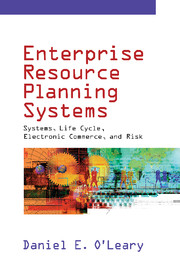5 - ERP Output Capabilities
from PART TWO - ERP SYSTEMS
Published online by Cambridge University Press: 05 June 2012
Summary
Access to ERP information was at first limited to the reports that could be generated from the system or through database queries of the underlying database model. Recently, however, organizations have begun to employ intranets and data warehouses to further distribute ERP-generated information. In addition, ERP vendors have begun to develop “portals” that are designed to provide users specific access to a range of information. This has led to improvements in ease of use and hence to new opportunities in electronic commerce for ERP vendors.
ERP Reporting and Query Capabilities
With ERP systems, information is made available to particular users in the form of specific reports. In addition, there are other approaches to generating data from the system, including database queries. Recently, ERP reporting capabilities have begun to evolve as ERP vendors have tried to increase the accessibility and ease of use of the ERP software.
ERP Reports
Enterprise resource planning systems can generate a wide range of standard reports that are designed to meet standard decision-making concerns. The reports that are available depend on the particular module of interest. For example, financial modules produce classic financial reports, including income statements and balance sheets.
However, ERP reports do not always meet the users' needs, as will be seen in a number of examples in this chapter.
- Type
- Chapter
- Information
- Enterprise Resource Planning SystemsSystems, Life Cycle, Electronic Commerce, and Risk, pp. 61 - 72Publisher: Cambridge University PressPrint publication year: 2000



